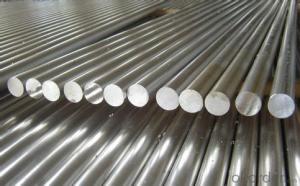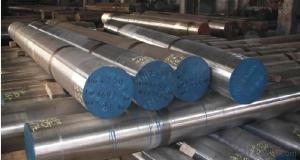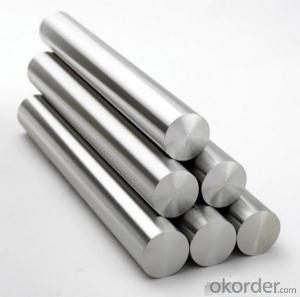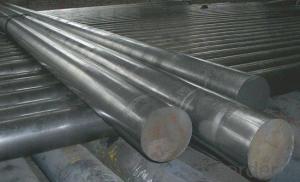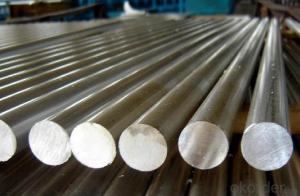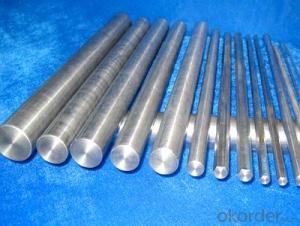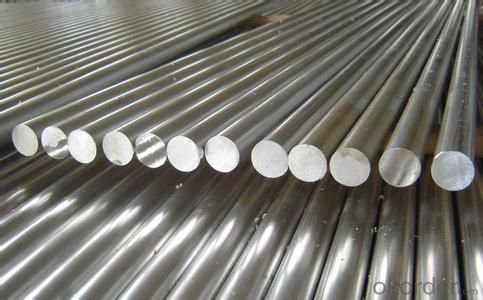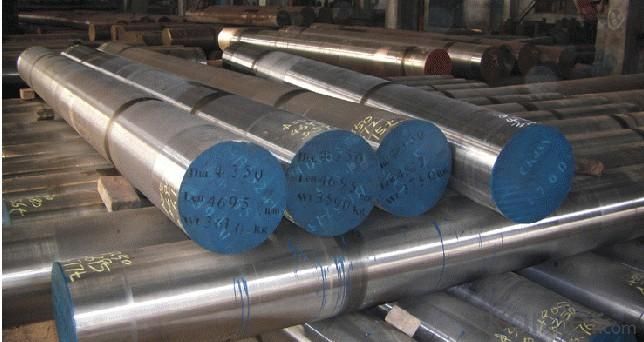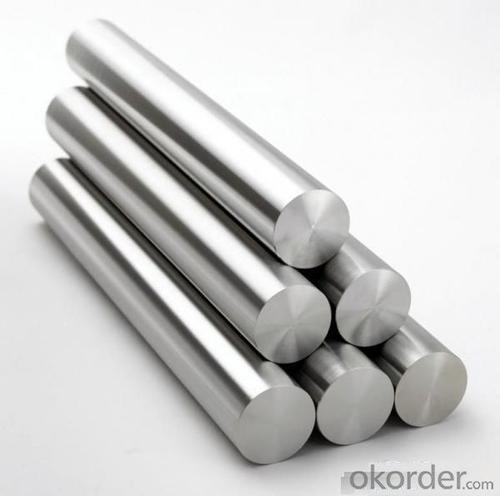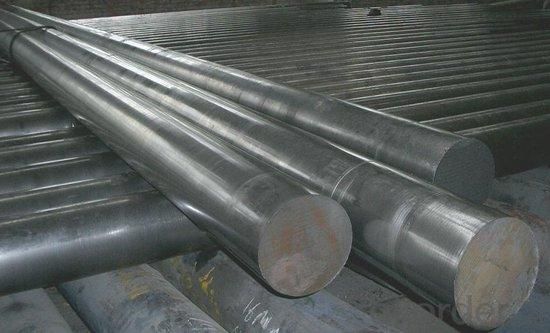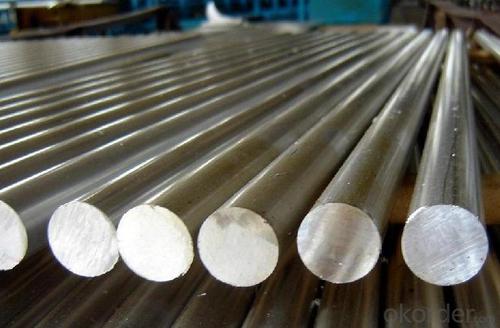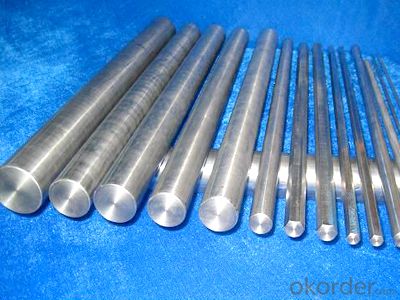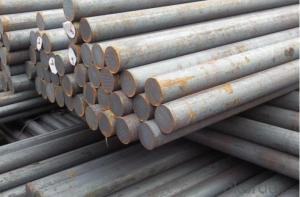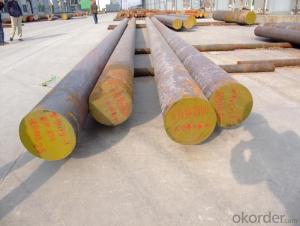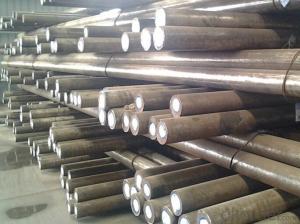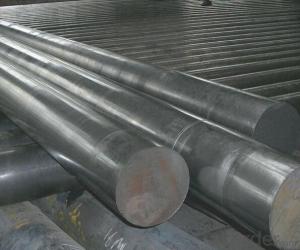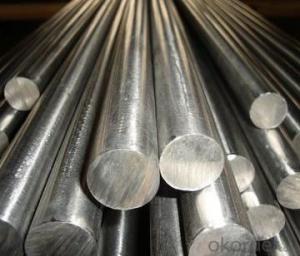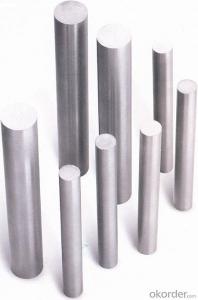Grade 316 Stainless Steel Round Bar Large Quantity in Stock
- Loading Port:
- Tianjin
- Payment Terms:
- TT OR LC
- Min Order Qty:
- 1 m.t.
- Supply Capability:
- 10000 m.t./month
OKorder Service Pledge
OKorder Financial Service
You Might Also Like
Specification
Grade 316 Stainless Steel Round Bar in stock
Descriptio of Grade 316 Steel Round Bar in Stock
(stainless steel round bar, angle bar , flat bar , channel bar , hexagon bar , square bar .)
1.grade:201,202,301,302,303,304,304L,308,309,310,310S,316,316L,321,410,420,430,etc.
2.diameter:3mm-400mm.
3.surface:bright , black , pickeled & bright .
4.length: no more than 6 m .
5.packing: according to international standards of export .
6.trade terms: FOBshanghai , CIF+import port .
7.payment terms: L/C at sight , 30% T/T in advance + copy of B/L .
8.delivery time: within 8 to 12 days since the receipt of payment .
9. MOQ is 1 ton .
Description of Grade 316 Steel Round Bar in Stock
Standard | AISI , JIS , ER , GB , ASTM , etc. |
| Grade | 201,201,301,302,303,304,304l,308,309,310,310S,316,316L,321,410,420,etc. |
| Application | widely used in the areas as ss fasteners , chains , kitchen and sanitary wares , furniture handles , handrails , electroplating and electrolyzing pendants , foods, electron , petroleum , construction and decoration , etc. with a high strength after cold-drawn , anti-stress corrosion , good surface . |
| Chemcial composition | according to international standards of ASTM , AISI , JIS , ER , GB ,etc. |
Company Information of Grade 316 Steel Round Bar in Stock
CNBM International Corporation is the most import and export platform of CNBM group(China National Building Material Group Corporation) ,which is a state-owned enterprise, ranked in 270th of Fortune Global 500 in 2015.
With its advantages, CNBM International are mainly concentrate on Cement, Glass, Iron and Steel, Ceramics industries and devotes herself for supplying high quality series of refractories as well as technical consultancies and logistics solution.
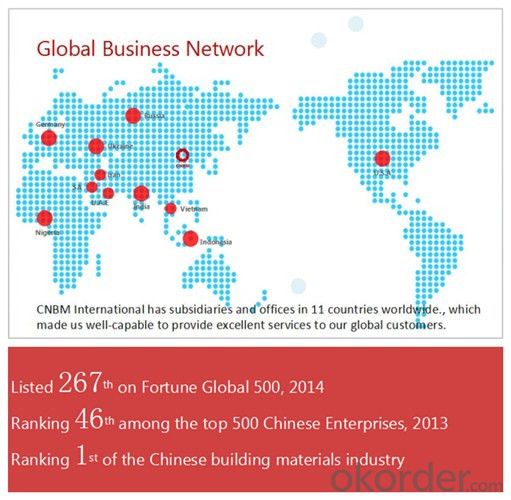
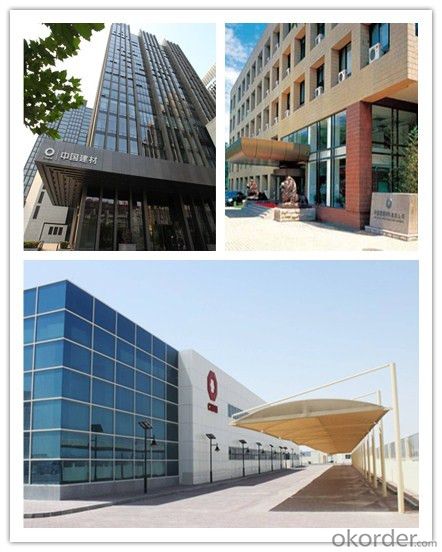
Packaging & Delivery of Grade 316 Steel Round Bar in Stock
Packaging Detail | Sea worthy packing /as per customer's packing instruction |
Delivery Detail | 15 ~ 40 days after receiving the deposit |
Products Show
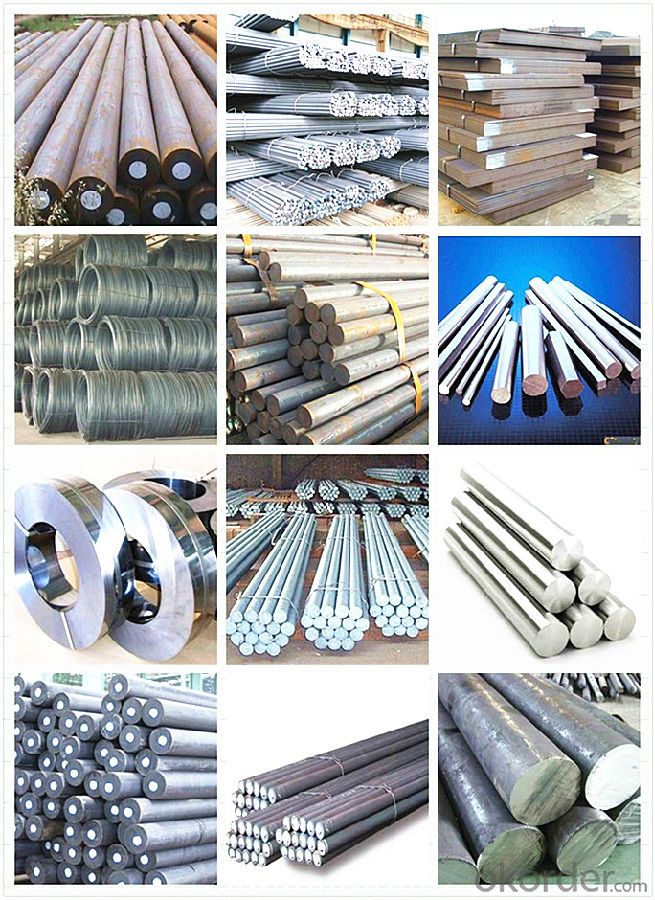
FAQ:
Are you a trading company or manufacturer? | Manufacturer |
What’s the MOQ? | 3 metric ton |
What’s your delivery time? | 15-35 days after downpayment received |
Do you Accept OEM service? | Yes |
what’s your delivery terms? | FOB/CFR/CIF |
What's the Payment Terms? | 30% as deposit,70% before shipment by T/T |
Western Union acceptable for small amount. | |
L/C acceptable for large amount. | |
Scrow ,Paybal,Alipay are also ok | |
Why choose us? | Chose happens because of quality, then price, We can give you both. Additionally, we can also offer professional products inquiry, products knowledge train (for agents), smooth goods delivery, excellent customer solution proposals. |
What's your available port of Shipment? | Main Port, China |
What’s your featured services? | Our service formula: good quality+ good price+ good service=customer's trust
|
Where are your Market? | Covering more than 160 countries in the world |
- Q: Can special steel be used in the telecommunications industry?
- Yes, special steel can be used in the telecommunications industry. Special steel, such as stainless steel or corrosion-resistant steel, can be utilized for various applications in telecommunications infrastructure, including tower structures, antenna components, cables, and connectors. These types of steel offer high strength, durability, and corrosion resistance, ensuring reliable and long-lasting performance in the telecommunications sector.
- Q: How does cryogenic treatment affect the toughness of special steel?
- Cryogenic treatment significantly improves the toughness of special steel. It involves subjecting the steel to extremely low temperatures, typically below -150°C, resulting in the transformation of retained austenite into martensite. This process enhances the steel's microstructure, reducing residual stresses and increasing its hardness, wear resistance, and overall toughness. The cryogenic treatment also refines the grain structure, leading to improved mechanical properties and increased resistance to fatigue and cracking.
- Q: What are the different surface protection methods used for special steel?
- There are several surface protection methods used for special steel to enhance its durability and resistance to various forms of damage. One commonly used method is galvanizing, where a layer of zinc is applied to the surface of the steel. This helps to protect the steel from corrosion and rusting, increasing its lifespan and maintaining its appearance. Galvanizing can be done through hot-dip galvanizing or electroplating, depending on the specific requirements of the steel. Another method is powder coating, which involves applying a dry powder to the steel surface and then curing it in high temperatures. This creates a protective layer that is resistant to chipping, scratching, and fading. Powder coating is often used for aesthetic purposes as it provides a wide range of color options and can improve the steel's appearance. Additionally, special steel can be protected using various types of paints and coatings. These coatings can be applied through spray or brush, and they provide a barrier against corrosion, chemicals, and UV radiation. Epoxy, polyurethane, and acrylic coatings are commonly used for this purpose, depending on the specific needs and environment the steel will be exposed to. Furthermore, stainless steel is inherently resistant to corrosion due to its composition, but it can be further protected by passivation. Passivation is a chemical treatment that removes iron particles from the surface, preventing corrosion and enhancing the steel's resistance to staining and pitting. Lastly, special steel can also be protected by applying a layer of ceramic or enamel coating. These coatings provide a high level of resistance to heat, chemicals, and physical abrasion. They can be applied through spraying or dipping and are often used in environments where the steel will be exposed to extreme conditions or aggressive substances. In conclusion, the different surface protection methods used for special steel include galvanizing, powder coating, painting, passivation, and ceramic/enamel coating. These methods aim to enhance the steel's durability, resistance to corrosion, and overall lifespan, ensuring that it can withstand various environmental factors and maintain its structural integrity.
- Q: How does special steel contribute to the oil and gas aftermarket industry?
- Due to its unique properties and capabilities, special steel plays a vital role in the oil and gas aftermarket industry. Its resistance to corrosion makes it well-suited for use in the harsh and corrosive environments commonly found in this sector. By preventing corrosion, special steel extends the lifespan of equipment and components, reducing the need for frequent replacements and maintenance. Additionally, special steel offers high strength and durability, enabling it to withstand the extreme pressures and temperatures encountered in oil and gas operations. This strength ensures that equipment and components made from special steel can function reliably and efficiently, even under demanding conditions. Moreover, special steel can be customized to meet the specific requirements of the oil and gas industry. With its various grades and compositions, special steel can possess specific properties, such as resistance to sulfide stress cracking, hydrogen embrittlement, and high-temperature oxidation. These tailored properties make special steel suitable for critical applications, including wellheads, pipelines, valves, and other equipment used in the oil and gas aftermarket industry. Furthermore, special steel allows for the production of complex and intricate components that are essential for the oil and gas sector. Its excellent machinability and weldability enable the creation of precision-engineered parts, ensuring the efficient and reliable operation of oil and gas equipment. In conclusion, special steel plays a significant role in the oil and gas aftermarket industry by providing corrosion resistance, high strength, durability, customization options, and the ability to manufacture intricate components. These properties make special steel indispensable in ensuring the safety, reliability, and efficiency of operations in the oil and gas sector.
- Q: What are the different corrosion protection methods used for special steel?
- To ensure the durability and longevity of special steel, various methods are employed for corrosion protection. These methods encompass: 1. Coatings: The application of diverse coatings, including paint, epoxy, or zinc, creates a protective layer on the steel surface. Such coatings function as barriers, preventing direct contact between moisture, corrosive elements, and the steel. 2. Galvanization: By coating the steel with a layer of zinc through the process of galvanization, a sacrificial barrier is formed wherein the zinc corrodes instead of the steel. Galvanized steel is commonly utilized in outdoor applications such as fences, poles, and roofing. 3. Stainless steel: Special steel can be manufactured using stainless steel, which contains a high percentage of chromium. The presence of chromium results in the formation of a passive layer on the steel's surface, endowing it with excellent corrosion resistance. Stainless steel finds wide usage in industries like construction, food processing, and medical equipment. 4. Cathodic protection: This method involves the creation of an electrical current or the utilization of sacrificial anodes to protect the steel. By introducing a more reactive metal (sacrificial anode) or applying an electrical current, corrosion is minimized as the reactive metal corrodes instead of the steel. 5. Alloying: Modifying the steel's composition by incorporating elements like nickel, molybdenum, or copper can enhance its resistance to corrosion. These alloying elements form a protective layer on the surface, rendering the steel more resistant to rust and other forms of corrosion. 6. Passivation: Passivation is a chemical process that eliminates free iron from the steel's surface, leading to the formation of a protective oxide layer. This layer acts as a barrier against corrosion, augmenting the steel's resistance to rust and other forms of corrosion. 7. Proper maintenance: Regular inspection, cleaning, and maintenance of special steel play a vital role in preventing corrosion. The removal of dirt, debris, and other contaminants from the steel's surface aids in preserving its protective coatings and averting corrosion. It is crucial to select the appropriate corrosion protection method based on the specific application and environmental conditions to ensure the long-term performance and durability of special steel.
- Q: What are the different magnetic grades of special steel?
- Various applications commonly utilize different magnetic grades of special steel. Some well-known magnetic grades include: 1. Soft Magnetic Materials: These special steel grades possess high magnetic permeability and low coercivity. They are ideal for applications requiring strong magnetic induction, such as transformers, electric motors, and magnetic cores for electrical devices. 2. Martensitic Stainless Steels: In their hardened state, these special steel grades exhibit a high magnetic permeability. They are commonly employed in cutlery, tools, and specific automotive components. 3. Ferritic Stainless Steels: Although their magnetic permeability is lower compared to martensitic stainless steels, these special steel grades are still magnetic. They find application in automotive exhaust systems, decorative trim, and appliances. 4. Duplex Stainless Steels: These special steel grades have a mixed microstructure of austenite and ferrite, resulting in a magnetic response. They are renowned for their exceptional corrosion resistance and are utilized in chemical processing equipment and offshore oil and gas platforms, where both strength and corrosion resistance are crucial. 5. Austenitic Stainless Steels: In their annealed state, these special steel grades are non-magnetic. However, slight magnetism can be observed when they undergo cold working or contain specific alloying elements. Austenitic stainless steels are widely used in food processing equipment, architectural structures, and medical devices. It is important to remember that the presence or absence of magnetism in special steel grades can vary depending on factors such as composition, heat treatment, and processing. Therefore, it is essential to consider the specific requirements of an application when selecting the appropriate magnetic grade of special steel.
- Q: Can special steel be used for making chemical processing equipment?
- Yes, special steel can be used for making chemical processing equipment. Special steel, such as stainless steel or corrosion-resistant alloys, are commonly used in the construction of chemical processing equipment due to their excellent resistance to corrosion, high temperature and pressure, and ability to withstand harsh chemical environments.
- Q: How long does special steel typically last in various applications?
- The lifespan of special steel in various applications can vary significantly depending on factors such as the type of steel, the specific application, and the conditions it is subjected to. However, special steel is generally known for its durability and longevity, and it can last for several decades or even longer in many applications, especially when properly maintained and used within its recommended limits.
- Q: How does special steel contribute to the nuclear industry?
- The nuclear industry heavily relies on special steel for multiple reasons. To begin with, this type of steel is exceptionally resistant to corrosion and can endure extreme temperatures and pressures. As a result, it is an ideal material for constructing nuclear reactors and other components, ensuring the safety and longevity of nuclear power plants. Additionally, special steel is used in manufacturing fuel assemblies and storage containers for nuclear fuel. These containers must effectively contain radioactive materials without any leakage or contamination. Special steel possesses the necessary strength and durability to meet these requirements. Furthermore, special steel is crucial in the fabrication of steam generators, which are essential components in nuclear power plants. Steam generators transfer heat from the reactor to the turbines, generating electricity. Given the high temperature and pressure conditions inside steam generators, it is essential to use a material that can withstand these harsh circumstances. Special steel fulfills this requirement. Moreover, special steel is employed in the production of control rods. These rods play a vital role in regulating the nuclear reaction within the reactor core by being inserted or withdrawn to control the rate of fission and maintain a stable reaction. Special steel's mechanical properties and resistance to radiation damage ensure the reliability and effectiveness of control rods. Additionally, special steel is utilized in constructing shielding materials and containment structures. These structures aim to protect workers, the environment, and the general public from radiation exposure. Due to its excellent radiation shielding properties, special steel is the preferred material for these applications. In conclusion, special steel is essential to the nuclear industry as it provides the necessary strength, durability, and resistance to corrosion, heat, and radiation. It enables the safe and efficient operation of nuclear reactors, facilitates the storage and transportation of nuclear fuel, and safeguards personnel and the environment.
- Q: How is special steel used in the automotive industry?
- Special steel is used in the automotive industry for various applications such as engine components, suspension systems, and safety features. Its unique properties, including high strength, durability, and heat resistance, make it ideal for manufacturing critical parts that require exceptional performance and reliability.
Send your message to us
Grade 316 Stainless Steel Round Bar Large Quantity in Stock
- Loading Port:
- Tianjin
- Payment Terms:
- TT OR LC
- Min Order Qty:
- 1 m.t.
- Supply Capability:
- 10000 m.t./month
OKorder Service Pledge
OKorder Financial Service
Similar products
Hot products
Hot Searches
Related keywords
